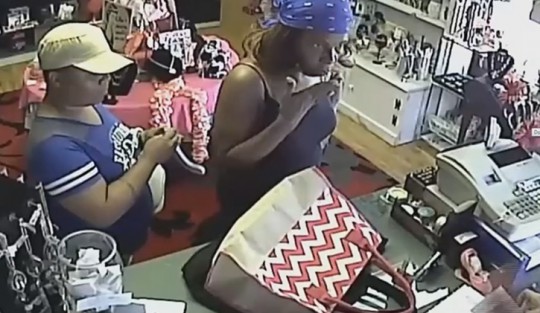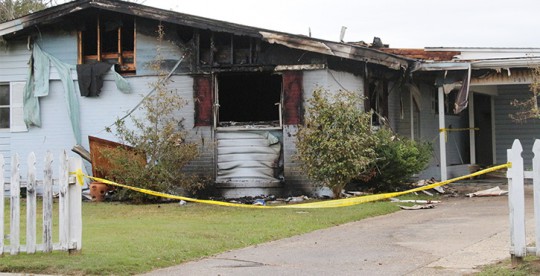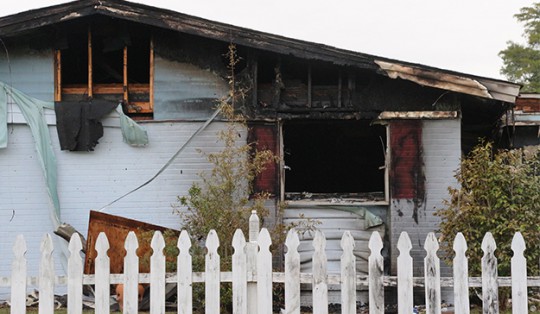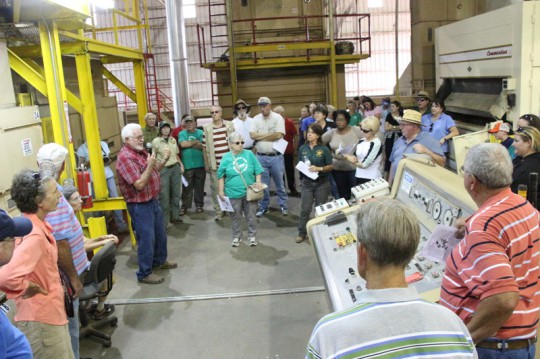Two Women Suspected In Theft From Nine Mile Business
October 14, 2015
The Escambia County Sheriff’s Office is searching for the two women in this surveillance camera image.
Investigators said Tuesday that they are suspected of stealing an employee’s wallet at Uniquely Yours Boutique on East Nine Mile Road last month. A witness says while one woman distracted the employee, the other stole the wallet. The victim’s credit cards were then used multiple times.
Anyone with information on their identity is asked to call the Escambia County Sheriff’s Office at (850) 436-9620 or Crime Stoppers at (850) 433-STOP.
Image courtesy Escambia County Sheriff’s Office for NorthEscambia.com, click to enlarge.
Gambling Talks Continue Between The Seminoles And Scott
October 14, 2015
Seminole casinos would get craps and roulette, a Palm Beach County dog track could have slot machines and the state could reap at least $3 billion over seven years, under a gambling deal being negotiated between state leaders and the tribe.
The agreement — still a long way from being finalized — would also allow a new gambling operation in Miami-Dade County to start up with slot machines and permit dog tracks to stop racing greyhounds while retaining lucrative card rooms.
 Multiple sources close to the negotiations provided details to The News Service of Florida about the ongoing talks between the Seminoles and Gov. Rick Scott’s office, which is working in tandem with House and Senate leaders to rewrite a 20-year agreement, called a “compact,” that authorized the tribe’s slot-machine and table-game operations. A provision of the deal, inked in 2010, gave the Seminoles exclusive rights to operate banked card games, such as blackjack, for five years in exchange for a minimum payment of $1 billion. That portion of the compact expired this summer.
Multiple sources close to the negotiations provided details to The News Service of Florida about the ongoing talks between the Seminoles and Gov. Rick Scott’s office, which is working in tandem with House and Senate leaders to rewrite a 20-year agreement, called a “compact,” that authorized the tribe’s slot-machine and table-game operations. A provision of the deal, inked in 2010, gave the Seminoles exclusive rights to operate banked card games, such as blackjack, for five years in exchange for a minimum payment of $1 billion. That portion of the compact expired this summer.
Under the talks, the Seminoles would guarantee a minimum $3 billion over seven years as part of compact that would last another 20 years.
“What I can confirm is that negotiations have made significant progress. We’re at a place where the taxpayers will be seeing a significantly higher share from the tribe than they currently receive. That would be hundreds of millions of dollars that we could use to invest in education, infrastructure or other core services. … I can also confirm that we could do all of this and also, for the first time, contract gaming in areas where it’s dying,” Senate Regulated Industries Chairman Rob Bradley, R-Fleming Island, told The News Service on Tuesday.
A portion of the revenues would go to supplement purses for thoroughbred horse races, now running at Gulfstream Racetrack and Tampa Bay Downs.
The latest proposal would also ban “player-banked” card games, now underway at a number of pari-mutuels, in Miami-Dade and Broward counties. Pari-mutuels in other counties could continue to run the games, in which the “bank” is another player instead of “the house,” but the state would impose clearer guidelines regarding the popular games.
The Seminoles contend that the games, first authorized by state gambling regulators in 2011, violate the tribe’s rights to exclusivity in operating banked card games, which typically involve players betting against the house instead of against each other.
Many of the components now under discussion don’t directly affect the Seminoles but instead deal with the pari-mutuel industry and would be considered as part of a bill authorizing the agreement, which lawmakers would most likely consider during the legislative session that begins in January.
For example, the Seminoles are purportedly “agnostic” about decoupling horse and dog racing from other gambling activities, including slots at the South Florida pari-mutuels and card rooms at facilities in other counties. Currently, pari-mutuels are required to have racing or jai alai games if they want to offer card rooms or slots.
While it is almost certain that any legislation would allow dog tracks to drop greyhound races, doing away with horse racing is more contentious. One possibility, according to sources involved in the talks, would require thoroughbred tracks to continue racing but allow tracks that use other types of horses, such as quarter horses, to do away with racing altogether if they choose.
The Seminoles are also seeking to tighten a “hope provision” included in the original agreement that allows the tribe to reduce its payments to the state if South Florida pari-mutuels are allowed to have banked card games, or if slots are authorized at any facilities that weren’t already operating in Broward or Miami-Dade, except for Hialeah Race Track, when the deal was signed in 2010.
That could dash South Florida operators’ hopes of adding blackjack. Instead, they would have to settle for decoupling and as much as a 10 percent reduction in the tax rate that they pay on slot machine revenues.
Getting the requisite support for such a deal from the Republican-dominated Legislature is problematic. Many members are prone to protect pari-mutuel operators in their own backyards or have ideological objections to gambling in general, which could prompt them to cast a “no” vote against any gambling-related proposal.
Slots for the Palm Beach Kennel Club are considered crucial to getting any bill out of Bradley’s Regulated Industries Committee, whose members include several Palm Beach County legislators.
The addition of slots would be contingent on the track’s purchase of at least one active pari-mutuel license elsewhere, according to those involved in the negotiations. The same would apply to a new gambling permit for a facility in Miami-Dade County, which would likely be granted based on a competitive bid and require some sort of payment to the state. Both the new facility and the Palm Beach dog track would be restricted to having fewer slots than the maximum 1,500 machines now allowed at pari-mutuels in Broward and Miami-Dade counties.
Granting slots to the Palm Beach dog track while prohibiting the cash cows in other counties where voters have approved them — including Lee, Brevard and Gadsden — is rife with political problems. Limiting slots expansion to Palm Beach County, just north of the two counties where slots are already in operation, could gain support among gambling-leery conservatives in the House. But it could also cost the endorsement of legislators who want their local operators to reap the same benefits.
Requiring the Legislature’s approval injects doubt into a complicated gambling agreement much like “putting a queen-sized sheet on a king-sized bed,” according to House Regulatory Affairs Chairman Jose Felix Diaz, a Miami-Dade County Republican.
“It’s a Rubik’s cube. I don’t think a Rubik’s cube is impossible to solve. If you give an intelligent person enough time, they’ll figure it out. But in the world of competing interests where you have so many other things taking place. … Right now we’ve been singularly focused on the compact because it’s the off-season. But we’re about to ramp up and start swallowing water out of the fire hose. So where Rob Bradley and I have been able to fully dedicate ourselves to this negotiation over the past few months, now I’m going to have to be digesting insurance bills and energy bills and business regulation bills that come before my committee. The timeline for an easy landing is winding down. With each passing day, it becomes more difficult to have a soft landing,” Diaz told The News Service on Tuesday.
And, unlike nearly a decade ago when then-Gov. Charlie Crist championed the gambling deal with the Seminoles, neither Scott nor leaders in the House and Senate leader have openly advocated for a new agreement with the tribe, making the odds for final passage of a compact even longer.
“The state of the economy is completely different than it was when the original deal was inked back in 2010. At the time the deal was put together, the state budget was enhanced by $435 million. Now, we’re in a situation where the economy is much better. We’re not spending or counting on the dollars from the Seminole Tribe. And we’re not dealing with a governor who is defending an existing deal as being valid, like we were with Gov. Crist back then,” said Senate Majority Leader Bill Galvano, a Bradenton Republican who, as a House member, was instrumental in crafting the 2010 deal with the Seminoles.
by Dara Kam, The News Service of Florida
Northview Chiefs Volleyball Marks Senior Night
October 14, 2015
Tuesday night was Senior Night for the Northview High School volleyball team as they honored seniors Hanna Ging, Savanna Roux, Maddi Weber, Leah Fischer, Brittney Ward and Laurie Purdy.
On the court, W.S. Neal defeated Northview 18-25, 25-19, 20-25, 25-11, 15-12. In junior varsity action, W.S. Neal defeated Northview 25-22, 27-25.
Both teams will travel to West Florida on Thursday.
Pictured top: Northview seniors (L-R) Hanna Ging, Savanna Roux, Maddi Weber, Leah Fischer, Brittney Ward and Laurie Purdy. NorthEscambia.com photos by Gary Amerson, click to enlarge.
FHP Investigating Fatal Crash
October 14, 2015
A fatal crash Tuesday in Escambia County is under investigation by the Florida Highway Patrol.
According to the FHP, a 2010 Toyota Camry drive by 57-year old Doan Thi Thuy-Nga and a 2004 Chevrolet Cavalier drive by 76-year old Clara Darby Ward collided at the intersection of Mobile Highway and Boulder Avenue.
Ward was pronounced deceased at Sacred Heart Hospital after the crash; Thuy-Nga was taken to Sacred Heart in serious condition.
The FHP has not released details on the cause of the accident as they continue their traffic homicide investigation. And charges are pending the outcome of that investigation.
Flags At Half Staff Today In Escambia County For Fallen Airman
October 14, 2015
 Flags in Escambia County will be at half-staff today in honor of Air Force Senior Airman Nathan C. Satain of Pensacola. Sartain, 29, lost his life in support of Operation Freedom’s Sentinel when his C-130 aircraft crashed in Afghanistan on October 2, 2015. He was assigned to the 66th Security Forces Squadron of Massachusetts.
Flags in Escambia County will be at half-staff today in honor of Air Force Senior Airman Nathan C. Satain of Pensacola. Sartain, 29, lost his life in support of Operation Freedom’s Sentinel when his C-130 aircraft crashed in Afghanistan on October 2, 2015. He was assigned to the 66th Security Forces Squadron of Massachusetts.
Funeral services for Sartain, a graduate of Pensacola High School, were held today at the Naval Aviation Memorial Chapel with burial at Barrancas National Cemetery with full military honors.
While deployed to Afghanistan, the 66th performed fly-away security team, better known as FAST, missions, meaning they flew on aircraft and were protecting the aircraft itself, the aircrew, passengers, and cargo, as these aircraft flew from one location to another.
Betty J. Harper
October 14, 2015
Betty J. Harper went home to be with our Lord on Monday, October 12, 2015. Betty was born June 26, 1930, to Walter Arick and Naomi Robinson Arick in Columbus, Ohio. She moved to Pensacola, FL in 1970 where she continued to raise her family.
Betty was preceded in death by her parents; her first husband, Nelson Hane; and her second husband, Delbert “Red” Harper, Jr.; son, Charles Hane; daughters-in-law, Sherry Hane and Cheety Hane; and son-in-law, David Reeves.
She is survived by her children, Nelson (Nettie) Hane, Kenny (Donna) Hane, Diana (JR) Howard, Carol Reeves, Sandy (Doug) Whitfield; 20 grandchildren; 29 great-grandchildren; and two very special friends Ronnie and Diane Hemby.
Our family would like to thank Dr. Miley and Covenant Hospice for all their wonderful care to our mom.
Funeral services will be held at 2 p.m. on Friday, October 16, 2015, at Faith Chapel Funeral Home North.
Burial will follow in Gonzalez United Methodist Church Cemetery.
A visitation will be held on Thursday, October 15, 2015, from 5 p.m. until 7 p.m. at Faith Chapel Funeral Home North.
Faith Chapel Funeral Home North is in charge of arrangements.
Jacqueline “Jackie” Ann Diederich Swain
October 14, 2015
Jacqueline “Jackie” Ann Diederich Swain, 81, of Cantonment, died Sunday, October 11, 2015. Jackie was born in Garrett, IN and moved to Pensacola 44 years ago. She worked as a teacher’s aide at Ensley Elementary for many years. Jackie was also a Girl Scout leader and a board member for both Cantonment Baseball and Football.
Jackie is preceded in death by her loving husband, Robert Louis Swain, Jr.; her parents, Herman Diederich and Anna Simpson Diederich; and two sisters, Lorreta Raub and Barbara Hoffmeyer.
She is survived by her son, Christopher Swain of Cantonment; four daughters, Melissa Swain Jacobs of Pensacola, Linda (Charlie) Martz of Corunna, IN, Lorie (Scott) Romero of IN, and Christine Lott of Foley, AL; Gregory Jacobs, who she considered a son; 11 grandchildren, Rachel (Nate) Schermerhorn of Kendallville, IN, Nicklaus (Cyndi) Martz of Oak Park, IL, Tyler (Rachel) Martz of Auburn, IN, Mariah (Austin) Miller of Corunna, IN, Maria and Olivia Romero of IN, Christian, Braedan, and Noah Jacobs of Cantonment, Kaylee Swain of Pensacola, and Ava Berroa of Pace; and four great-grandchildren, Myles and Margo Martz of Oak Park, IL and Grant and Gabriella Schermerhorn of Kendallville, IN.
Jackie was a loving mother and a super Nana.
Funeral services will be held at 11 a.m. on Thursday, October 15, 2015, at Faith Chapel Funeral Home North with Father Casstley officiating.
Burial will follow in Pensacola Memorial Gardens Cemetery.
A visitation will take place Wednesday, October 14, 2015, from 5 p.m. until 7 p.m. at Faith Chapel Funeral Home North.
Faith Chapel Funeral Home North is in charge of arrangements.
Another Atmore Home Heavily Damaged By Fire
October 13, 2015
A home in the 300 block of South Presley Street in Atmore was heavily damaged by fire early Tuesday morning. It was the second house fire in Atmore in less than 24 hours.
There were no injuries reported in either fire.
For information about Monday’s fire, click here for an earlier story.
NorthEscambia.com photos, click to enlarge.
Today: Supreme Court To Hear Death Penalty Case From 1998 Nine Mile Popeye’s Murder
October 13, 2015
FOR AN UPDATE TO THIS STORY, CLICK HERE.
Today, U.S. Supreme Court is scheduled hear arguments in a challenge to the way Florida sentences people to death — a challenge backed by three former Florida Supreme Court justices and the American Bar Association.
The case, which stems from the 1998 murder of a Nine Mile Road Escambia County fast-food worker, focuses on the role that juries play in recommending death sentences, which ultimately are imposed by judges.
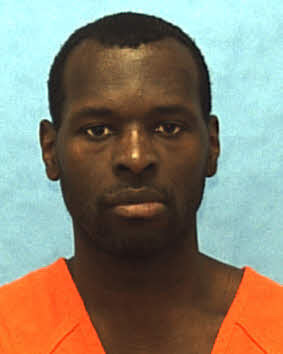 Hurst, now 36, was convicted in the 1998 murder of Cynthia Lee Harrison, who was an assistant manager at a Popeye’s Fried Chicken restaurant where Hurst worked. Harrison’s body was discovered bound in a freezer, and money was missing from a safe, according to a brief in the case.
Hurst, now 36, was convicted in the 1998 murder of Cynthia Lee Harrison, who was an assistant manager at a Popeye’s Fried Chicken restaurant where Hurst worked. Harrison’s body was discovered bound in a freezer, and money was missing from a safe, according to a brief in the case.
Attorneys representing Death Row inmate Timothy Lee Hurst, including former U.S. Solicitor General Seth Waxman, contend that Florida’s unique sentencing system is unconstitutional. Supporting that position in friend-of-the-court briefs are former Florida Supreme Court justices Harry Lee Anstead, Rosemary Barkett and Gerald Kogan, along with the American Bar Association and seven former Florida circuit judges.
Part of the argument centers on what are known as “aggravating” circumstances that must be found before defendants can be sentenced to death. Hurst’s attorneys argue, in part, that a 2002 U.S. Supreme Court ruling requires that determination of such aggravating circumstances be “entrusted” to juries, not to judges.
Also, they take issue with Florida not requiring unanimous jury recommendations in death-penalty cases. A judge sentenced Hurst to death after receiving a 7-5 jury recommendation.
“Florida juries play only an advisory role,” Hurst’s attorneys wrote in a May brief. “The jury recommends a sentence of life or death based on its assessment of aggravating and mitigating circumstances, but that recommendation has no binding effect. Moreover, the jury renders its advisory verdict under procedures that degrade the integrity of the jury’s function. Unanimity, and the deliberation often needed to achieve it, is not necessary; only a bare majority vote is required to recommend a death sentence.”
But in an earlier brief, attorneys for the state argued that the U.S. Supreme Court and the Florida Supreme Court have repeatedly denied challenges to the sentencing process, including the Florida Supreme Court rejecting Hurst’s challenge. The state attorneys argued that a jury, in recommending the death penalty, has found facts that support at least one aggravating factor — which can be the basis for sentencing a defendant to death.
“Therefore, because the jury returned a recommendation of death, this court may infer the jury did find at least one aggravating circumstance beyond a reasonable doubt,” state attorneys wrote in a January brief in the U.S. Supreme Court.
In sentencing Hurst to death, a judge found two aggravating circumstances — that the murder was committed during a robbery and that it was “especially heinous, atrocious or cruel,” according to the brief filed by Hurst’s attorneys. That brief, along with others in the case, were posted on an American Bar Association website and on SCOTUSblog, which closely tracks U.S. Supreme Court proceedings.
Much of the hearing could focus on how to apply the 2002 U.S. Supreme Court decision — a major case known as Ring v. Arizona — to the Florida law. Hurst’s attorneys contend that the 2002 decision held that “findings of fact necessary to authorize a death sentence may not be entrusted to the judge.” They said Florida’s system undermines the juries’ constitutional “functions as responsible fact-finder and voice of the community’s moral judgment.”
The brief filed on behalf of Anstead, Barkett and Kogan raised similar arguments and said there is “no assurance that Florida death sentences are premised on a particular aggravating circumstance found by the jury.”
“And because jury unanimity is not mandated during the sentencing process, there is no assurance that a Florida jury’s death recommendation represents a reliable consensus of the community,” the brief said. “As a consequence, (the former justices) believe that the jury’s role is impermissibly denigrated and that there is an unacceptable risk that Florida death sentences are erroneously imposed, in violation of the Sixth and the Eighth Amendments to the Constitution of the United States.”
by Jim Saunders, The News Service of Florida
Farm Tour Highlights North Escambia Agriculture (With Photo Gallery)
October 13, 2015
Participants in the Escambia County Farm Tour recently learned about agriculture in the North Escambia area.
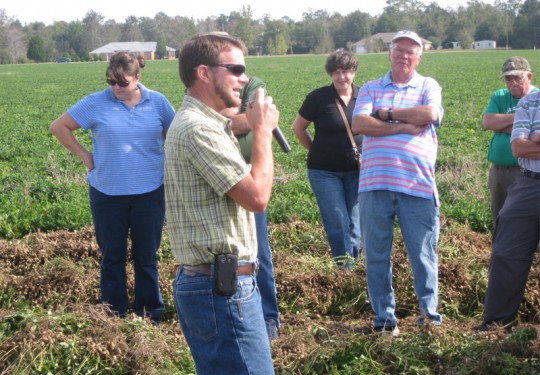 Local governmental officials, community leaders and even international visitors toured several agricultural locations in North Escambia and get an up close and personal look at a variety of farming activities.
Local governmental officials, community leaders and even international visitors toured several agricultural locations in North Escambia and get an up close and personal look at a variety of farming activities.
Following registration at the Molino Community Center, farm tour participants heard presentations from 4-H members before heading to Lulu Road in Molino to learn about forestry. Attendees then observed peanut production with Eric Koehn on Crabtree Church Road, visited the Birdsong Peanut Buying Point outside Atmore, and watched a cotton harvest with Mike Koehn on Kansas Road in Walnut Hill.
The farm tour then stopped to observe the growth of a sun hemp, a cover crop growing at Highway 97 and Kansas Road in Walnut Hill, and then visited the West Florida Gin Company on Meadows Road near Davisville.
Pictured top: Cotton production, and pictured inset: Peanut production. Submitted photos for NorthEscambia.com. Pictured below: Inside the West Florid Gin with cotton ginning equipment. NorthEscambia.com photo, click to enlarge.


